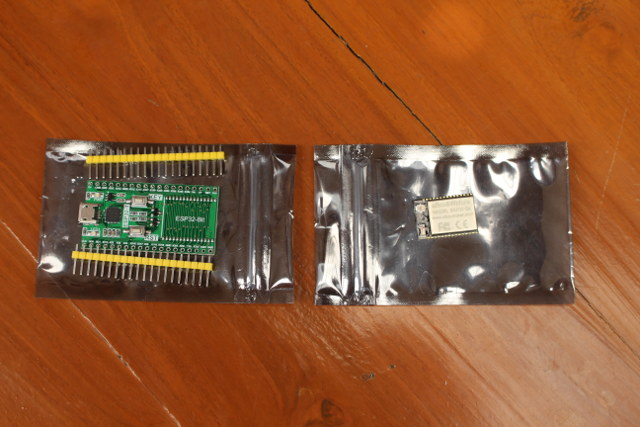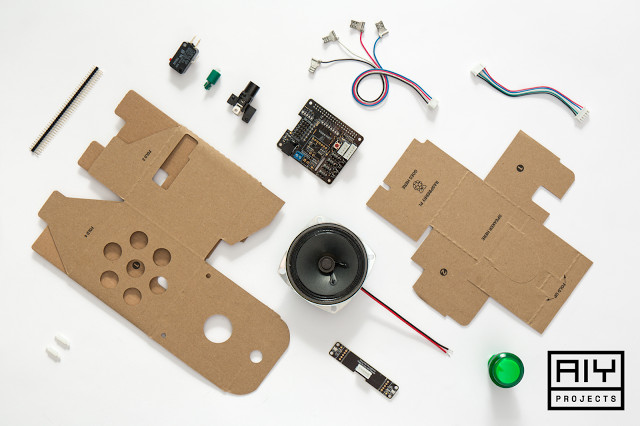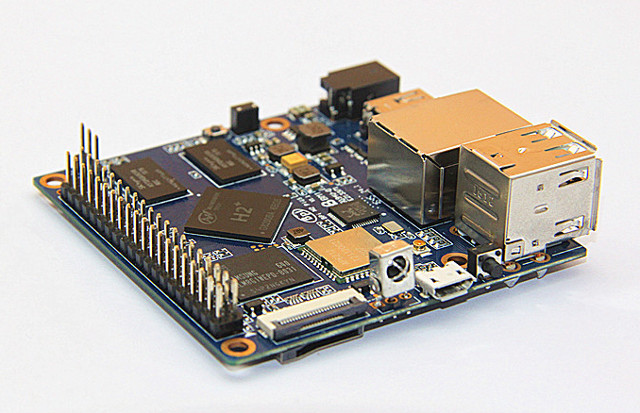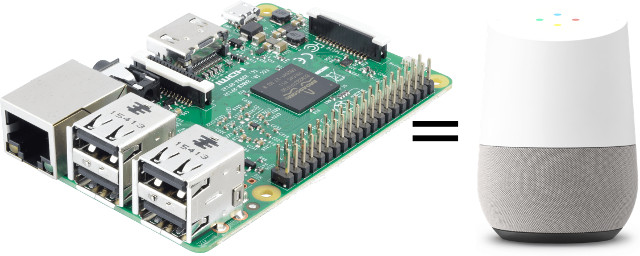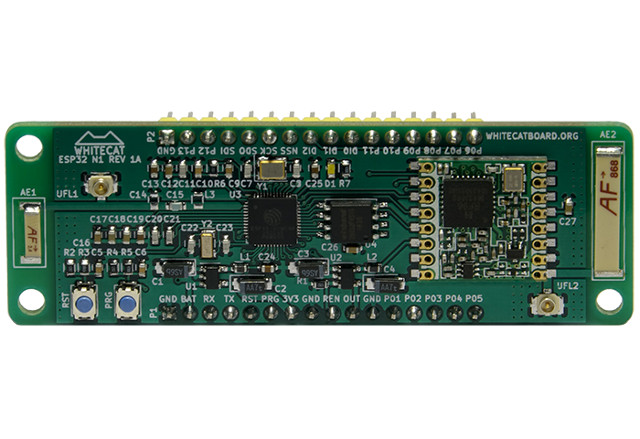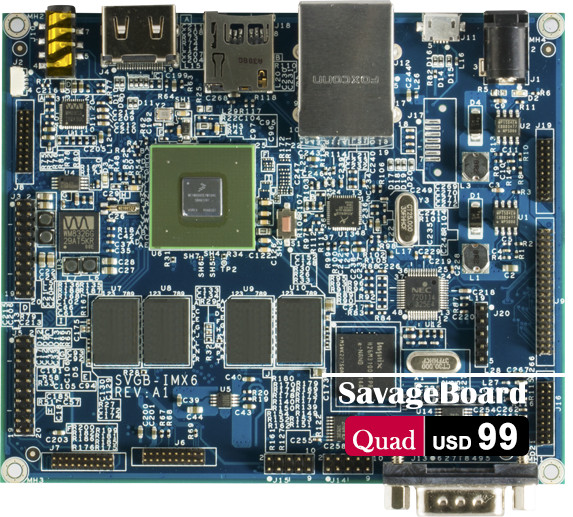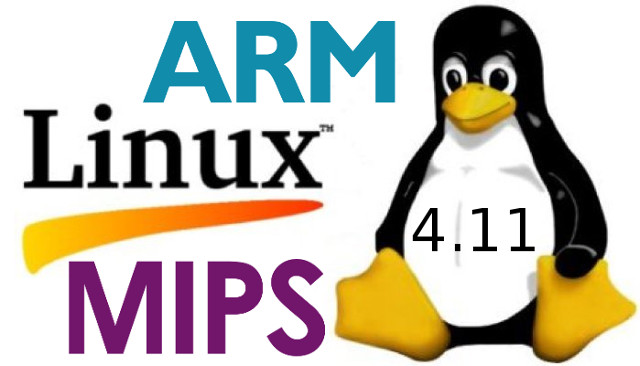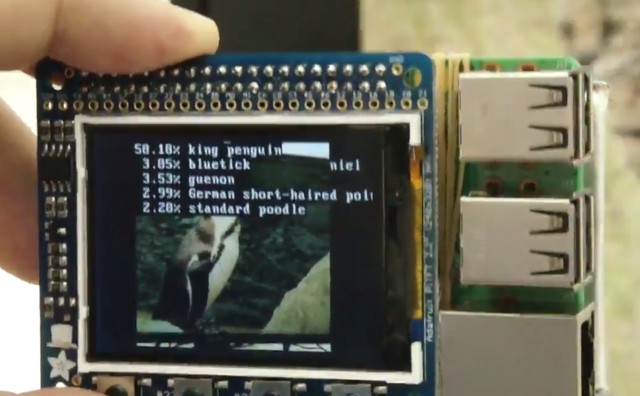Espressif ESP32 may have launched last year, but prices have only dropped to attractive levels very recently, and Espressif has recently released released ESP-IDF 2.0 SDK with various improvements, so the platform has become much more interesting than just a few weeks ago. ICStation also sent me ESP32-T development board with ESP32-bit module, so I’ll first see what I got, before trying out Arduino for ESP32 on the board. ESP32-T development board with ESP-bit Module – Unboxing & Soldering One thing I missed when I asked for the board is that it was not soldered, and it comes in kit with ESP32-bit module in one package, and ESP32-T breakout board with headers in another package. The 21.5x15mm module is based on ESP32-DOWNQ6 processor with 32 Mbit (4MB) of flash, a chip antenna, and a u.FL connector. The module is apparently made by eBox, and also used in Widora board with […]
AIY Projects Voice Kit Transforms Raspberry Pi 3 Into Google Home, Comes Free with Raspberry Pi Magazine
We’ve just reported about the preview release of Google Assistant SDK that works on the Raspberry Pi 3, and other boards with a microphone, speakers, and access to Internet. The Raspberry Pi foundation and Google have now made it even easier, as they launched AIY Projects Voice Kit with a Google Voice HAT, a speaker, a stereo microphone Voice HAT board, a button, a few cables, and a cardboard case. You’ll just need to add your own Raspberry Pi 3, follow the instructions to assemble kits, load and setup the software. Once this is all done, you’ll be able to press the top button, asking anything you want to Google Voice, including the weather. Price? Sort of free, as it comes with MagPi 57 magazine, where you’ll also find detailed instructions for the kit. Google AIY Projects got its name from a mix between (DIY) and artificial intelligence (AI), and […]
SinoVoIP Releases $35 Banana Pi BPI-M2+ Board with Allwinner H2+ Processor
Banana Pi BPI M2+ board was first released with Allwinner H3 processor, but the same PCB can also be used with Allwinner H2+ and H5 processors since the processors are pin-to-pin compatible, and SinoVoIP intends to release three version of the board, and just launched BPI M2+ (aka BPI H2+) with Allwinner H2+ processor for $34.50 + shipping, $1.5 cheaper than the H3 version also listed on Aliexpress. If you shop around, and don’t order on the official SinoVoIP store, you may find cheaper price for the boards. As expected, the specifications have not changed apart from the processor: SoC – Allwinner H2+ quad core Cortex A7 @ 1.2 GHz with an ARM Mali-400MP2 GPU up to 600 MHz System Memory – 1GB DDR3 Storage – 8GB eMMC flash, micro SD card slot up to 64GB, Video & Audio Output – HDMI with CEC support Connectivity – Gigabit Ethernet, 802.11 […]
Google Assistant SDK Turns Your Raspberry Pi 3 into Google Home
Google Home allows you to select music, control your home automation system and more with voice commands, but now you can do the same with a Raspberry Pi 3 as Google released a developer preview (alpha v1) of the Google Assistant API that works on Raspberry Pi 3, and other development boards running Debian or Ubuntu. Functionalities are limited right now, with RPC API and Python sample code, but it only works with English language, and features such as timers & alarm, playing music, news, or podcasts, and precise location are not supported. Location is determined using your IP address only, and if you’re using some third party services / products such as Uber or Hue, you’ll need an actual Google Home device for initial setup. Google has provided instructions to use Google Assistant SDK with Raspberry Pi 3 board. First you’ll need a USB microphone ($5.99 on Amazon), and […]
Whitecat ESP32 N1 Board Combines ESP32 WiFi + Bluetooth SoC with a LoRa Transceiver, Runs Lua RTOS
Espressif ESP32 SoC is gaining traction right now as prices have come down, and there’s still an on-going fight among LPWAN standards with LoRaWAN being fairly popular in Europe. Whitecat, a group of engineers from several companies based in Citilab, Barcelona, Spain, has designed a board that combines both ESP32 and a LoRA transceiver, bringing an alternative to Pycom LoPy board, but instead of running MicroPython, they have developed Lua-RTOS. Whitecat ESP32 N1 hardware specifications: SoC – Espressif ESP32 dual-core Tensilica LX6 microprocessor @ up to 240MHz with 520kB internal SRAM Storage – 4MB flash memory Connectivity LoRa WAN transceiver working in the 868 (EU) MHz / 915 (USA) MHz with on-board antenna, and u.FL connector for external antenna Integrated 802.11b/g/n WiFi transceiver with on-board antenna, and u.FL connector for external antenna Integrated dual-mode Bluetooth (classic and BLE) I/O Headers – 2x 16-pin with SPI, I2C, I2S, SDIO, UART, CAN, […]
SavageBoard Open Source Hardware Board Powered by NXP i.MX 6 Processor Offers Multiple Display Options
While it’s hard to keep track of all NXP i.MX6 boards and modules on the market, few can claim to be open source hardware, with the exception of OpenRex, and now SavageBoard, which I just found in Linux 4.11 release log. The board comes in three variants with Solo, Dual, and Quad versions, is equipped with 4 to 8GB flash, 512MB to 1GB RAM, HDMI, TFT LCD, MIPI DSI, and LVDS ports, Ethernet, SATA (Quad only), lots of I/O headers, and more. SavageBoard Solo/Dual/Quad specifications: SoC Solo – NXP i.MX 6Solo Cortex A9 processor @ 1.0 GHz with Vivante GC880 3D GPU Dual – NXP i.MX 6Dual dual core Cortex A9 processor @ 1.0 GHz with Vivante GC880 3D GPU Quad – NXP i.MX 6Quad quad core Cortex A9 processor @ 1.0 GHz with Vivante GC2000 3D GPU System Memory Solo – 512 MB 32-bit DDR3 @ 400 MHz Dual […]
Linux 4.11 Release – Main Changes, ARM & MIPS Architecture
Linus Torvalds has just released Linux 4.11: So after that extra week with an rc8, things were pretty calm, and I’m much happier releasing a final 4.11 now. We still had various smaller fixes the last week, but nothing that made me go “hmm..”. Shortlog appended for people who want to peruse the details, but it’s a mix all over, with about half being drivers (networking dominates, but some sound fixlets too), with the rest being some arch updates, generic networking, and filesystem (nfs[d]) fixes. But it’s all really small, which is what I like to see the last week of the release cycle. And with this, the merge window is obviously open. I already have two pull request for 4.12 in my inbox, I expect that overnight I’ll get a lot more. Linux 4.10 added Virtual GPU support, perf c2c’ tool, improved writeback management, a faster initial WiFi connection […]
GPU Accelerated Object Recognition on Raspberry Pi 3 & Raspberry Pi Zero
You’ve probably already seen one or more object recognition demos, where a system equipped with a camera detects the type of object using deep learning algorithms either locally or in the cloud. It’s for example used in autonomous cars to detect pedestrian, pets, other cars and so on. Kochi Nakamura and his team have developed software based on GoogleNet deep neural network with a a 1000-class image classification model running on Raspberry Pi Zero and Raspberry Pi 3 and leveraging the VideoCore IV GPU found in Broadcom BCM283x processor in order to detect objects faster than with the CPU, more exactly about 3 times faster than using the four Cortex A53 cores in RPi 3. They just connected a battery, a display, and the official Raspberry Pi camera to the Raspberry Pi boards to be able to recognize various objects and animals. The first demo is with Raspberry Pi Zero. […]


